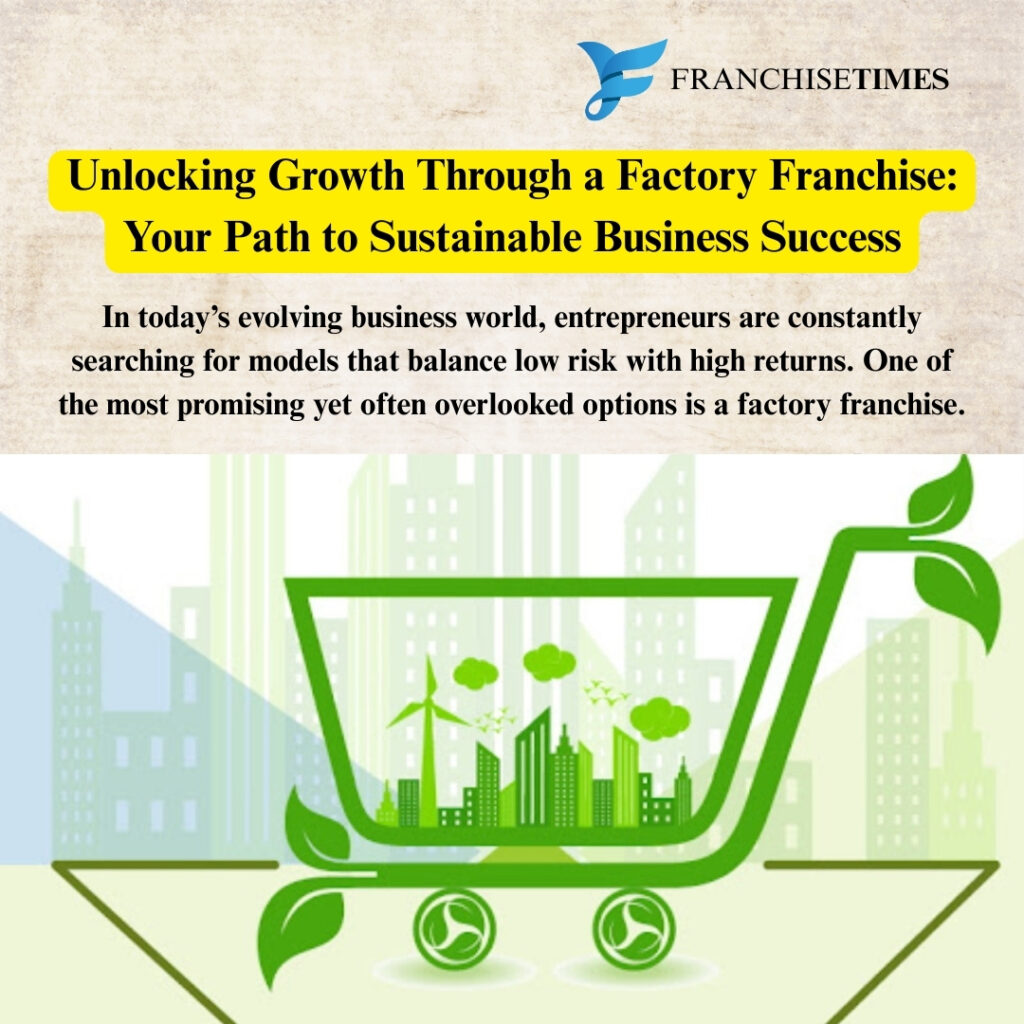Unlocking Growth Through a Factory Franchise: Your Path to Sustainable Business Success
In today’s evolving business world, entrepreneurs are constantly searching for models that balance low risk with high returns. One of the most promising yet often overlooked options is a Factory Franchise Business Growth. Unlike traditional retail or food franchises, this model goes deeper into the production side of business, offering partners an opportunity to be part of manufacturing and distribution. The demand for goods across industries—from textiles to construction materials—makes this model a solid and scalable investment option.

In this blog, we will explore how a factory franchise works, why it’s gaining popularity, the benefits it brings, challenges you should consider, and the steps you can take to build long-term success.
Understanding the Factory Franchise Model
To start with, let’s define what makes a factory franchise different. Unlike standard franchises where you only deal with sales or service, here you are directly linked with the production unit. In this model, the parent company allows franchisees to set up or run a factory under its brand, ensuring that quality, processes, and brand consistency remain intact.
This approach not only strengthens the brand’s supply chain but also allows entrepreneurs to tap into a business with ready-made demand. For example, in industries like packaged food, furniture, or building materials, the brand already has a market presence. As a factory franchisee, you become part of that chain, securing orders while maintaining production standards set by the company.
Moreover, this model bridges the gap between large-scale manufacturers and local markets. Instead of centralizing everything in one location, companies expand faster by empowering partners through factories spread across regions. This decentralized approach ensures faster delivery, reduced logistics costs, and better customer satisfaction.
Why a Factory Franchise is a Smart Investment
When evaluating opportunities, entrepreneurs often weigh risks against potential growth. A factory franchise offers a unique combination of security and scalability that few other models provide.
First, it reduces uncertainty. Since you are connected to an established brand, you don’t have to build credibility from scratch. The parent company’s reputation and distribution channels support your operations. In addition, most companies provide training, technology support, and quality control systems, which minimize operational challenges.
Second, the earning potential is significant. Unlike a retail franchise, where revenue depends heavily on walk-in customers, a factory franchise caters to bulk buyers, wholesalers, and even international clients. This means larger order sizes and consistent cash flow.
Third, this model encourages innovation within structure. While you follow the brand’s manufacturing guidelines, you often have room to optimize local operations, improve efficiency, and manage costs. This balance between freedom and guidance makes it highly appealing to investors who want control but still value support.
Finally, long-term sustainability sets it apart. Manufacturing industries tend to be less volatile compared to service-based sectors. As long as essential goods are needed, factory franchises will continue to thrive.
Key Benefits of Running a Factory Franchise
Starting a factory franchise comes with multiple advantages that can accelerate your business growth. Let’s explore the major benefits in detail:
- Proven Business Model
One of the biggest attractions of franchising is the ability to follow a tested and successful model. You don’t need to reinvent the wheel. The parent company already knows what works, and you get to benefit from years of experience. - Established Brand Recognition
Building trust takes years. However, with a factory franchise, you step into a market where customers already recognize and trust the brand. This shortens the time it takes to start generating revenue. - Operational Support
From machinery setup to workforce training, many franchisors offer end-to-end support. This ensures that you can focus on productivity rather than worrying about technical know-how. - Bulk Orders and Steady Demand
Since factories typically produce in large volumes, you can secure contracts with wholesalers, distributors, and institutional clients. This brings stability in income and reduces dependency on small daily transactions. - Lower Marketing Costs
Most parent companies run large-scale advertising campaigns. As a franchisee, you indirectly benefit from this visibility without spending heavily on promotions. - Networking Opportunities
Being part of a franchise system connects you with other factory owners under the same brand. This network can be a valuable source of knowledge sharing, collaboration, and problem-solving.
These benefits highlight why more entrepreneurs are turning to this model to secure sustainable business growth.
Challenges You Should Prepare For
While the benefits are clear, it is equally important to understand the challenges before starting a factory franchise. Every business model comes with its own demands, and this one is no exception.
- Initial Investment Requirements
Setting up a factory requires significant capital. Even with franchisor support, you will need funds for land, machinery, manpower, and raw materials. - Compliance and Regulations
Manufacturing businesses often face strict regulatory requirements. You must comply with safety standards, labor laws, and environmental regulations. Staying updated with these rules is crucial. - Operational Complexity
Running a production unit is more complex than managing a retail store. You need to oversee supply chains, quality checks, workforce management, and maintenance schedules. - Market Fluctuations
Although manufacturing is generally stable, certain industries may face demand fluctuations. For instance, construction-related factories may experience seasonal slowdowns. - Dependence on Parent Company
While franchisor support is helpful, you may feel limited by their rules and lack of independence in decision-making. Balancing compliance with innovation requires strategic thinking.
By being aware of these challenges, you can prepare in advance, build contingency plans, and ensure smoother operations.
Steps to Build a Successful Factory Franchise
If you are ready to explore this opportunity, it’s important to follow a structured path. The journey of building a profitable factory franchise involves several steps:
- Research the Industry
Start by analyzing industries that interest you. Consider demand, growth potential, competition, and long-term trends. Select a sector where you see stable and rising demand. - Evaluate Franchise Options
Look for brands that have a strong reputation, proven success, and clear franchise terms. Compare investment requirements, royalty fees, and support systems. - Understand the Legal Framework
Before signing agreements, consult legal experts to understand the contract, compliance obligations, and your rights as a franchisee. - Arrange Capital and Resources
Secure funding through savings, loans, or investors. Ensure that you also plan for working capital, as manufacturing often requires upfront spending on raw materials. - Set Up Infrastructure
Work with the franchisor to establish factory facilities. This includes machinery installation, layout planning, safety measures, and workforce recruitment. - Focus on Quality and Efficiency
In manufacturing, quality is everything. Follow the brand’s standards strictly, while also optimizing local processes to reduce costs and increase efficiency. - Build Relationships with Distributors
Engage with wholesalers, retailers, and institutional clients. Strong partnerships ensure consistent demand for your products. - Monitor Performance Regularly
Track production, sales, and expenses. Use modern tools to analyze efficiency, detect issues early, and make informed decisions.
By following these steps, you can transform your franchise into a profitable and scalable venture.
Conclusion: Is a Factory Franchise Right for You?
The idea of owning a Factory Franchise Business Growth may seem ambitious at first, but when approached with planning and discipline, it can be one of the most rewarding business opportunities. Unlike traditional franchises that rely heavily on foot traffic or seasonal demand, this model offers consistent orders, brand recognition, and long-term sustainability.
However, it’s important to balance enthusiasm with realism. Understanding the investment, legal requirements, and operational complexity will prepare you for success. If you have the vision to manage people, maintain quality, and adapt to challenges, a factory franchise could be your gateway to building wealth and stability.
In the end, this model is not just about manufacturing products; it’s about creating opportunities, building networks, and becoming part of a larger ecosystem that drives industry forward. For entrepreneurs seeking both profitability and purpose, the factory franchise stands as a strong contender in the modern business landscape.
